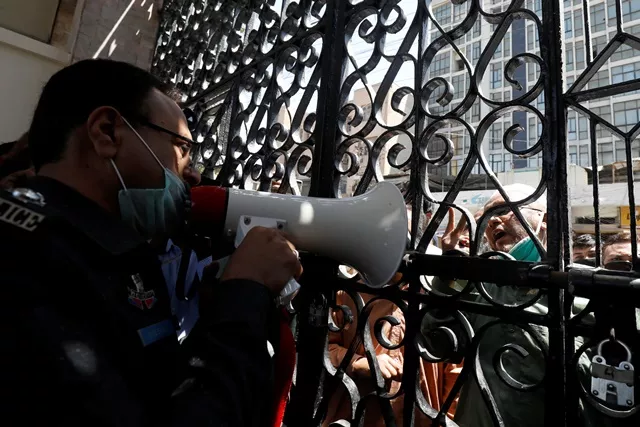Right-wing nationalism and healthcare
Pakistan also has had its share of the intervention of the right-wing political organisations in public health
The technologically modern world that we live in is in harm’s way for two reasons: the spread and absorption of fake news; and the rise of right-wing nationalist politics. The outbreak of the coronavirus has exposed human fragility in understanding nature. It has exposed that being a bigot is being insane. It has also exposed that public health has not been on the radar of most economies, which had been too busy in wars, closing borders and making trade challenging.In August 2018, Indonesia’s Ulema Council issued a decree asking the observant Muslims to stop using the measles vaccine because one of its ingredients includes gelatine derived from pork. The response to the decree was appalling: millions of parents refused to get their children vaccinated. It did not stop there. The region of Aceh, which operates under religious law, barred vaccination teams from entering. Resultantly, only 8% of the children in Aceh could be vaccinated. In Java, one of the most populated islands of Indonesia, barely 68% children made it through the vaccination, whereas for effective protection 95% coverage was required. At the same time, a country from another continent and with a different belief system and experts, passed a similar, albeit a more frightening law, which ended all mandatory vaccinations for schoolchildren — for measles, tetanus, polio, and seven other diseases. Little did the Italian senators expect to see, only in two months, the exponential rise of measles — one of the most contagious diseases on the planet and a widespread cause of blindness, deafness, and brain damage. Without a hiatus, the infection spread across Europe, with 82,596 cases in 2018, compared to 5,273 two years earlier.
At the end of November 2018, an array of international health authorities including the World Health Organization (WHO), the Centres for Disease Control and Prevention (CDC), Unicef, and Gavi, the Vaccine Alliance, together warned: “We are losing decades of progress.”
Pakistan also has had its share of the intervention of the right-wing political organisations in public health. The family planning and polio immunisation programme had to struggle to find its roots in the country. Last year we had 146 polio cases. In 2020, with only four months down the line, polio cases are already at 37. On the family planning front, we have only ignited the engine.
During the height of the war of terrorism in early 2000, the religious scholars forbade parents to give polio vaccine to their children on the assumption that it carried properties to make children sterile. Vaccinators were harassed and killed. Polio campaigns were disrupted with terror attacks. Vaccines were stolen or replaced with fake ones.
Although Pakistan has marched past the terrorism era, it has been unable to replace the misconception attached to the polio vaccine. The seed has sunk too deep into the psyche, a glimpse of which we had a chance to see during the ongoing lockdown. For the last three Fridays, since social distancing has been enforced through lockdowns, we have been seeing people pelting stones on the police for forbidding them to pray in congregation. Chaos ensues every week to register the power of faith over science.
There is no harm in being conservative or having a strong faith unless it becomes so overbearing that it takes away vision from the plan, insight from the research and objectivity from the decision.
Places, where polio persists, have an identical geopolitical backstory — ethno-nationalist and religious forces setting out to destabilise a dominant government. That’s been the case for Pakistan, the Taliban in Afghanistan as well as for Boko Haram and tribal minorities in Nigeria. “The most important lesson we’ve learned is that if you intend to eradicate a disease — or at least achieve a high level of control of one — you should be thinking about how you engage ethnic and religious communities country by country, right from the start,” said Stephen Cochi, a senior adviser to the director of the CDC’s Global Immunization Division, which leads the agency’s polio eradication efforts. “Or history will repeat itself, and you’ll hit political or religious, ethnic, or ethnocentric obstacles that are inevitable.”
Public distrust in the country’s healthcare system eventually undermines the confidence of a larger segment of the population in the dynamics of health delivery services. “The more that we drive up the rhetoric so that people who are now in this country feel threatened by national policy, the more we stand the chance of having a separate society that doesn’t come into the health care system,” said Thomas Inglesby, the Director of the Center for Health Security at the Johns Hopkins Bloomberg School of Public Health. “So even as we strive to have strong public health systems and to get people vaccinated and to have early reporting on infectious diseases, that wouldn’t touch this separate group.”
Pathogens pay no respect to religion or politics. Right-wing rhetoric seeks to persuade us that ejecting expert opinion or constructing walls will protect us. They will not.
Published in The Express Tribune, April 9th, 2020.
Like Opinion & Editorial on Facebook, follow @ETOpEd on Twitter to receive all updates on all our daily pieces.


COMMENTS
Comments are moderated and generally will be posted if they are on-topic and not abusive.
For more information, please see our Comments FAQ